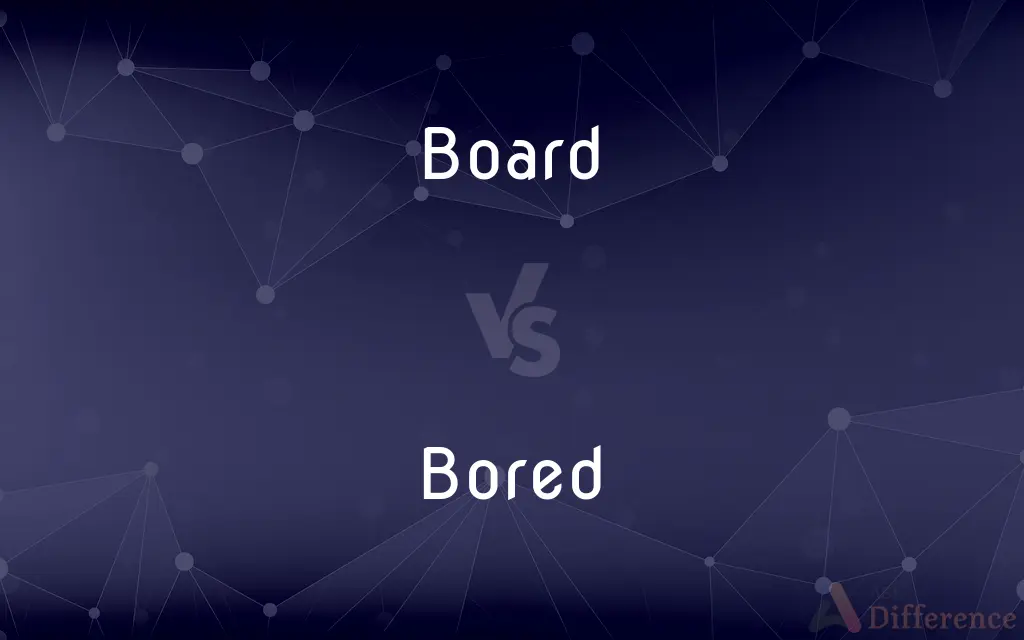Board vs. Bored — What's the Difference?
By Tayyaba Rehman & Fiza Rafique — Updated on March 11, 2024
"Board" and "bored" are homophones, while "board" refers to a long, flat piece of material, often wood, used for various purposes. "Bored" is an adjective describing a state of feeling weary or uninterested due to a lack of stimulation or interest.

Difference Between Board and Bored
Table of Contents
ADVERTISEMENT
Key Differences
"Board" can be used in various contexts, from construction, where it might refer to planks of wood, to organizational settings, where it represents a council or committee that oversees the operations of a company or institution. "Bored" is used to describe an emotional or psychological state. When someone says they are bored, it implies that they are not engaged or entertained by their current activity or surroundings.
"Board" can also be a verb, as in "to board a plane," meaning to enter or embark upon a vehicle. Boredom can lead to restlessness and a desire for change or stimulation.
The distinction between "board" and "bored" highlights the diversity of the English language, where words can sound identical but carry entirely different meanings based on their spelling and context.
Comparison Chart
Meaning
Refers to a flat piece of material or a group of decision-makers in an organization.
Describes a feeling of weariness and lack of interest.
Part of Speech
Can be a noun or verb, depending on usage.
Adjective
ADVERTISEMENT
Usage Example
"We need more wooden boards for the project." / "The board will meet next Thursday."
"I'm bored with this lecture; it's not engaging."
Context
Construction, woodworking, organizational governance, transportation.
Emotional state, leisure activities, personal feelings.
Related Terms
Boardroom, boarding, aboard.
Boredom, disinterested, unenthused.
Compare with Definitions
Board
A long, flat piece of wood or other hard material, used for floors, furniture, etc.
The carpenter cut the board to size for the bookshelf.
Bored
Feeling weary and uninterested because one has nothing to do or because one finds something dull.
She was bored during the long lecture.
Board
A group of people constituted as the decision-making body of an organization.
The board of directors oversees the company's strategic direction.
Bored
Leisure activities, waiting situations, repetitive tasks.
He grew bored of playing the same video games.
Board
To enter or embark on a vehicle, such as a plane, train, or ship.
Passengers are advised to board the plane promptly.
Bored
The state of feeling bored.
To combat boredom, he took up a new hobby.
Board
Boardroom (a room where the board meets), boarding (the act of getting on a vehicle).
The CEO presented the annual report in the boardroom.
Bored
Often used to express a need for change, stimulation, or engagement.
I'm bored with the same routine every day; I need something new.
Board
A long flat slab of sawed lumber; a plank.
Bored
To make a hole in or through, with or as if with a drill.
Board
A long flat slab of another material, used as a structural member.
Bored
To form (a tunnel, for example) by drilling, digging, or burrowing.
Board
A flat, rigid, often rectangular piece of material used as a surface upon which to work
A cutting board.
An ironing board.
Bored
To proceed or advance steadily or laboriously
A destroyer boring through heavy seas.
Board
A blackboard.
Bored
To make weary by being dull, repetitive, or tedious
The movie bored us.
Board
A bulletin board.
Bored
Past tense of bear1.
Board
A scoreboard.
Bored
A hole or passage made by or as if by use of a drill.
Board
A toteboard.
Bored
A hollow, usually cylindrical chamber or barrel, as of a firearm.
Board
A flat piece of material designed or equipped to be ridden as a sport, especially a snowboard, skateboard, or surfboard.
Bored
The interior diameter of a hole, tube, or cylinder.
Board
A diving board.
Bored
The caliber of a firearm.
Board
A backboard.
Bored
A drilling tool.
Board
A flat, rigid piece of material on which a game is played, such as a checkerboard or chessboard.
Bored
One that is wearingly dull, repetitive, or tedious.
Board
A table at which official meetings are held; a council table.
Bored
Simple past tense and past participle of bore
Board
An organized body of administrators or investigators
A board of trustees.
A board of directors.
Bored
Suffering from boredom; mildly annoyed and restless through having nothing to do.
The piano teacher's bored look indicated he wasn't paying much attention to his pupil's lackluster rendition of Mozart's Requiem.
Board
A table, especially one set for serving food.
Bored
Perforated by a hole or holes.
Board
Food or meals considered as a whole
Board and lodging.
Bored
Tired of the world; bored with life.
Board
(Sports) The wooden structure enclosing an area for skating, such as the ice on which hockey is played, or enclosing a playing area, as for indoor soccer.
Bored
Uninterested because of frequent exposure or indulgence. Opposite of interested.
Board
A theater stage.
Bored
Tired of the world;
Bored with life
Strolled through the museum with a bored air
Board
(Basketball) A rebound.
Board
An electrical-equipment panel.
Board
(Computers) A circuit board.
Board
The side of a ship.
Board
A leeboard.
Board
A centerboard.
Board
(Obsolete) A border or edge.
Board
To cover or close with boards
Board up a broken window.
Board
To furnish with meals in return for pay.
Board
To house where board is furnished
Board a horse at a stable.
Board
To enter or go aboard (a vehicle or ship).
Board
To allow (passengers) on board.
Board
(Nautical) To come alongside (a ship).
Board
(Sports) To force (an opposing hockey player) into the boards with a body check.
Board
(Obsolete) To approach.
Board
To receive meals or food and lodging as a paying customer.
Board
(Sports) To use a snowboard, skateboard, surfboard, or similar item.
Board
A relatively long, wide and thin piece of any material, usually wood or similar, often for use in construction or furniture-making.
Board
A device (e.g., switchboard) containing electrical switches and other controls and designed to control lights, sound, telephone connections, etc.
Board
A flat surface with markings for playing a board game.
Each player starts the game with four counters on the board.
Board
Short for blackboard, whiteboard, chessboard, surfboard, circuit board, message board (on the Internet), etc.
Board
A committee that manages the business of an organization, e.g., a board of directors.
We have to wait to hear back from the board.
Board
(uncountable) Regular meals or the amount paid for them in a place of lodging.
Room and board
Board
(nautical) The side of a ship.
Board
(nautical) The distance a sailing vessel runs between tacks when working to windward.
Board
The wall that surrounds an ice hockey rink.
Board
(archaic) A long, narrow table, like that used in a medieval dining hall.
Board
Paper made thick and stiff like a board, for book covers, etc.; pasteboard.
To bind a book in boards
Board
(video games) A level or stage having a particular layout.
Board
A container for holding pre-dealt cards that is used to allow multiple sets of players to play the same cards. Board (duplicate bridge)
Board
A rebound.
Board
(transitive) To step or climb onto or otherwise enter a ship, aircraft, train or other conveyance.
It is time to board the aircraft.
Board
(transitive) To provide someone with meals and lodging, usually in exchange for money.
To board one's horse at a livery stable
Board
(transitive) To receive meals and lodging in exchange for money.
Board
To capture an enemy ship by going alongside and grappling her, then invading her with a boarding party
Board
(intransitive) To obtain meals, or meals and lodgings, statedly for compensation
Board
To approach (someone); to make advances to, accost.
Board
To cover with boards or boarding.
To board a house
Board
To hit (someone) with a wooden board.
Board
(transitive) To write something on a board, especially a blackboard or whiteboard.
Board
A piece of timber sawed thin, and of considerable length and breadth as compared with the thickness, - used for building, etc.
Board
A table to put food upon.
Fruit of all kinds . . . She gathers, tribute large, and on the boardHeaps with unsparing hand.
Board
Hence: What is served on a table as food; stated meals; provision; entertainment; - usually as furnished for pay; as, to work for one's board; the price of board.
Board
A table at which a council or court is held.
Both better acquainted with affairs than any other who sat then at that board.
We may judge from their letters to the board.
Board
A square or oblong piece of thin wood or other material used for some special purpose, as, a molding board; a board or surface painted or arranged for a game; as, a chessboard; a backgammon board.
Board
Paper made thick and stiff like a board, for book covers, etc.; pasteboard; as, to bind a book in boards.
Board
The stage in a theater; as, to go upon the boards, to enter upon the theatrical profession.
Board
The border or side of anything.
Board
To cover with boards or boarding; as, to board a house.
Board
To go on board of, or enter, as a ship, whether in a hostile or a friendly way.
You board an enemy to capture her, and a stranger to receive news or make a communication.
Board
To enter, as a railway car.
Board
To furnish with regular meals, or with meals and lodgings, for compensation; to supply with daily meals.
Board
To place at board, for compensation; as, to board one's horse at a livery stable.
Board
To obtain meals, or meals and lodgings, statedly for compensation; as, he boards at the hotel.
We are several of us, gentlemen and ladies, who board in the same house.
Board
To approach; to accost; to address; hence, to woo.
I will board her, though she chide as loudAs thunder when the clouds in autumn crack.
Board
A committee having supervisory powers;
The board has seven members
Board
A flat piece of material designed for a special purpose;
He nailed boards across the windows
Board
A stout length of sawn timber; made in a wide variety of sizes and used for many purposes
Board
A board on which information can be displayed to public view
Board
A flat portable surface (usually rectangular) designed for board games;
He got out the board and set up the pieces
Board
Food or meals in general;
She sets a fine table
Room and board
Board
Electrical device consisting of an insulated panel containing switches and dials and meters for controlling other electrical devices;
He checked the instrument panel
Suddenly the board lit up like a Christmas tree
Board
A printed circuit that can be inserted into expansion slots in a computer to increase the computer's capabilities
Board
A table at which meals are served;
He helped her clear the dining table
A feast was spread upon the board
Board
Get on board of (trains, buses, ships, aircraft, etc.)
Board
Live and take one's meals at or in;
She rooms in an old boarding house
Board
Lodge and take meals (at)
Board
Provide food and lodging (for);
The old lady is boarding three men
Common Curiosities
Can "board" refer to meals in some contexts?
Yes, "board" can mean meals provided at a fixed rate, as in "room and board," where it refers to lodging and meals.
Can the term "board" be used in digital contexts?
Yes, "board" can refer to online platforms or interfaces, such as a dashboard or a message board, where information is displayed or shared.
What's the difference between "board of directors" and "board of trustees"?
A board of directors is typically found in for-profit organizations, focusing on business operations and shareholder interests, whereas a board of trustees is more common in non-profit or educational institutions, emphasizing fiduciary responsibilities and governance.
Are there any health benefits to experiencing boredom?
Boredom can sometimes lead to self-reflection, creativity, and finding new sources of meaning and satisfaction, which can contribute to personal growth and mental health.
How can one be elected to a board of directors?
Typically, candidates are nominated based on their expertise, experience, and potential contribution to the board, followed by an election by current board members or shareholders, depending on the organization's bylaws.
How can a board influence a company's direction?
A company's board of directors makes critical decisions regarding policies, strategies, and objectives, influencing its growth and direction.
Is feeling bored always negative?
Not necessarily. Boredom can lead to creativity, problem-solving, and finding new interests or solutions to challenges.
How is a "board" chosen in organizations?
Members of a board, such as a board of directors, are typically elected by shareholders or appointed based on expertise, leadership, and the ability to contribute to the organization's success.
What types of boards are there in construction?
In construction, there are various types of boards like plywood, particle board, and fiberboard, each with specific uses based on durability, strength, and resistance to elements.
Is it possible to never feel bored?
While it's unlikely to never experience boredom, individuals with a wide range of interests or who engage in creative and stimulating activities may feel bored less frequently.
What can I do if I find myself feeling bored?
Engaging in a new or favorite activity, learning something new, or changing your routine can alleviate boredom.
How can businesses effectively use boards for decision-making?
Effective use involves clear communication, diversity in expertise and perspectives among board members, regular meetings, and a strong focus on the organization's mission and strategic goals.
What strategies can help overcome boredom in the workplace?
Strategies include setting new challenges, personal development goals, seeking feedback for improvement, diversifying tasks, and incorporating elements of fun or innovation into daily routines.
Can "board" refer to modes of transportation other than planes and ships?
Yes, "to board" can also apply to trains, buses, and even some ridesharing services, essentially meaning to get onto any form of transportation.
What psychological theories exist to explain boredom?
Several theories, including the arousal theory (suggesting boredom results from low levels of arousal) and the attentional theory (suggesting boredom occurs when we cannot focus our attention on enjoyable activities), attempt to explain the underlying causes of boredom.
Share Your Discovery

Previous Comparison
Repetitive vs. Redundant
Next Comparison
Benchmark vs. DatumAuthor Spotlight
Written by
Tayyaba RehmanTayyaba Rehman is a distinguished writer, currently serving as a primary contributor to askdifference.com. As a researcher in semantics and etymology, Tayyaba's passion for the complexity of languages and their distinctions has found a perfect home on the platform. Tayyaba delves into the intricacies of language, distinguishing between commonly confused words and phrases, thereby providing clarity for readers worldwide.
Co-written by
Fiza RafiqueFiza Rafique is a skilled content writer at AskDifference.com, where she meticulously refines and enhances written pieces. Drawing from her vast editorial expertise, Fiza ensures clarity, accuracy, and precision in every article. Passionate about language, she continually seeks to elevate the quality of content for readers worldwide.














































